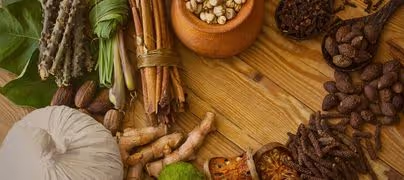When women ask me what they should eat during menopause, I always start with this question: "How do you feel after meals?" The answers tell me everything I need to know. "Bloated and tired." "Still hungry even after eating." "My energy crashes an hour later." "I crave sugar constantly."
These aren't just inconveniences - they're messages from your body about what it needs to thrive during this transition. While herbs provide concentrated healing and lifestyle practices create supportive rhythms, food is the foundation that either supports or undermines everything else you're doing for your health.
In Ayurveda, nutrition isn't about calories or macros - it's about choosing foods that bring your unique body back into balance. During menopause, when Vata dosha is naturally elevated, your dietary choices become even more crucial for maintaining stability and comfort.
Why Your Relationship with Food Changes During Menopause
Many women notice that foods they've eaten for years suddenly don't agree with them anymore. The salad that used to energize you now leaves you bloated. The glass of wine that helped you unwind now triggers hot flashes. The coffee that once provided steady energy now makes you jittery and anxious.
This isn't in your head - it's your body's changing needs speaking. As estrogen levels shift, your digestion becomes more sensitive. The digestive fire (Agni) that Ayurveda talks about becomes more variable, just like everything else during this transition.
Your body is also working harder to maintain balance with fewer hormones, which means it needs different nutritional support. The quick fixes and stimulants that might have worked in your 30s can actually create more instability in your 40s and 50s.
Understanding this shift is liberating. Instead of fighting your body's new requirements, you can learn to work with them, using food as a tool for creating the balance and energy you're seeking.
The Four Pillars of Ayurvedic Menopausal Nutrition
1. Warm, Grounding Foods: Your Stability Foundation
Cold, raw foods might seem healthy, but during menopause they can increase the airy, scattered quality that's already challenging your system. Your body craves warmth and grounding - foods that provide steady, reliable energy rather than quick hits and crashes.
Think of warming foods as giving your nervous system a gentle hug. Cooked vegetables, hearty stews, warm grains like oats and rice, and nourishing soups all help settle Vata energy. These foods are easier to digest when your system is already working hard to maintain balance.
I encourage women to start their day with something warm - perhaps oatmeal with stewed apples and cinnamon, or warm almond milk with turmeric and a touch of honey. This sets a grounding tone that carries through the entire day.
Root vegetables like sweet potatoes, carrots, and beets are particularly nourishing during this time. They grow underground, drawing earth energy that helps ground your airy Vata. Roasted with warming spices like ginger, cumin, or coriander, they become both medicine and comfort food.
Healthy fats play a crucial role too. A spoonful of ghee, coconut oil, or good olive oil added to meals helps lubricate dry tissues and supports hormone production. Many women notice that adding these healthy fats reduces joint stiffness and improves skin texture.
2. Cooling Foods for Internal Heat: Balancing the Fire Within
While warm foods ground you, cooling foods help manage the heat symptoms that plague many menopausal women. Hot flashes, night sweats, irritability, and inflammation all signal that your internal fire needs gentle cooling.
This doesn't mean eating ice cream (though occasional treats are fine!). It means choosing foods with naturally cooling properties. Cucumber, melons, coconut water, and leafy greens all help reduce internal heat without dampening your digestive fire.
Herbs and spices can be cooling too. Fennel tea after meals aids digestion while cooling the system. Fresh cilantro added to dishes helps neutralize heat. Mint tea can be refreshing and calming, especially in the afternoon.
Sweet fruits like pears, apples, and grapes provide cooling energy along with natural sugars that satisfy cravings without creating the blood sugar spikes that worsen hot flashes. Timing matters though - fruits are best eaten alone or before meals rather than as dessert.
Many women find that reducing obviously heating foods helps tremendously. This includes spicy foods, excessive caffeine, alcohol, and fried foods. You don't have to eliminate these completely, but becoming aware of how they affect your symptoms allows you to make conscious choices.
3. Bone-Building Nutrition: Strengthening Your Foundation
The drop in estrogen after menopause accelerates bone loss, making bone health a crucial focus. While supplements have their place, Ayurveda emphasizes getting nutrients from whole foods whenever possible.
Traditional calcium-rich foods include dairy products like milk, yogurt, and paneer (if you tolerate them well). In Ayurveda, warm milk with a pinch of turmeric before bed is considered both bone-building and sleep-supporting. Many women find that organic, grass-fed dairy feels different in their bodies than conventional products.
Seeds and nuts are nutritional powerhouses for bone health. Sesame seeds are particularly prized in Ayurveda - they're rich in calcium and have a naturally warming quality that's perfect for menopause. Try making a simple sesame butter or adding tahini to dressings and sauces.
Almonds soaked overnight and peeled in the morning are considered a perfect food for women's health. They provide healthy fats, protein, and minerals while being easy to digest when prepared this way.
Leafy greens like kale, collards, and bok choy provide calcium along with other bone-supporting nutrients. When cooked with warming spices, they become more digestible and satisfying than raw salads.
Don't forget about vitamin D, which helps your body use calcium effectively. While not traditionally emphasized in Ayurveda, morning sunlight has always been recommended for vitality. Spend 15-20 minutes outside each morning when possible.
4. Blood Sugar Balance: Steady Energy, Stable Moods
Fluctuating blood sugar can make menopausal symptoms much worse. When your blood sugar spikes and crashes, it triggers stress hormones that intensify hot flashes, mood swings, and sleep problems.
The Ayurvedic approach to blood sugar balance is beautifully simple: eat regular meals at consistent times, combining protein, healthy fats, and complex carbohydrates in each meal. This provides steady fuel without the dramatic ups and downs.
Start your day with protein and healthy fats. This might be eggs cooked in ghee with vegetables, or a warming porridge made with almond butter and seeds. Avoid starting with just coffee or sweet pastries, which set you up for energy crashes later.
Make lunch your largest meal when your digestive fire is naturally strongest. This is the time to eat your heartiest foods - perhaps a curry with vegetables and legumes, or a substantial grain bowl with protein and plenty of cooked vegetables.
Keep dinner lighter and earlier when possible. Your digestive fire naturally dims in the evening, so heavy meals can interfere with sleep and lead to morning sluggishness.
For snacks, choose combinations that provide sustained energy. Apple slices with almond butter, a handful of nuts and seeds, or warm milk with a pinch of cinnamon all help maintain steady blood sugar between meals.
Creating Your Personal Food Medicine Practice
The key to successful Ayurvedic nutrition isn't following rigid rules - it's developing awareness of how different foods affect your unique body. Start by keeping a simple food and symptom journal for a week. Notice patterns between what you eat and how you feel.
Pay attention to timing too. Many women find that eating their largest meal at midday and keeping dinner light dramatically improves their energy and sleep. Others discover that certain foods trigger hot flashes when eaten in the evening but are fine during the day.
Preparation matters as much as the foods themselves. Taking time to cook mindfully, eating without distractions, and chewing thoroughly all improve digestion and absorption. These simple practices can make the difference between a meal that energizes you and one that drains you.
Seasonal Eating: Following Natural Rhythms
Ayurveda teaches that your nutritional needs change with the seasons, and this becomes even more important during menopause when your system is already adapting to change.
In summer, emphasize cooling foods and lighter meals. Fresh fruits, cucumber, leafy greens, and cooling herbs help you stay comfortable during hot weather. In winter, increase warming spices, cooked grains, and hearty stews that provide the extra energy your body needs.
Spring is a natural time for gentle cleansing - perhaps reducing heavy foods and emphasizing bitter greens and lighter preparations. Fall calls for grounding, nourishing foods that help you prepare for the more introspective winter months.
Beyond Individual Foods: The Art of Eating
The most important aspect of Ayurvedic nutrition might be how you eat, not just what you eat. Eating in a calm, relaxed state improves digestion and absorption. This means putting away devices, sitting down for meals, and taking a few deep breaths before eating.
Gratitude for your food - acknowledging the plants, animals, farmers, and others who brought it to your table - creates a positive mental state that actually improves digestion. This isn't just spiritual practice; it's practical medicine.
Eating until you're about 75% full allows your digestive system to work efficiently without becoming overwhelmed. Many women find that this simple practice eliminates the bloating and fatigue they've experienced after meals.
Your Nourishing Path Forward
Remember that changing your relationship with food is a journey, not a destination. Start with one or two changes that feel manageable and build from there. Perhaps begin by making breakfast warm and nourishing, or by adding a spoonful of healthy fat to each meal.
Pay attention to your body's feedback without judgment. Some days you might need more grounding foods, others more cooling ones. Learning to read these signals is part of developing the intuitive wisdom that serves you throughout this transition and beyond.
Most importantly, approach food with joy and curiosity rather than restriction and fear. The goal isn't perfect eating - it's discovering how to nourish yourself in ways that support your highest vitality and well-being. When you eat with awareness and love, every meal becomes an opportunity for healing and connection with your body's innate wisdom. I recommend reading next my article: The Truth About Menopause Weight Gain and The Plan to Beat It.
Free Email Course to Better Understand Your Hormones
Get clear, practical information directly to your email, to help you manage hormonal changes.
In just few minutes a day, you'll learn:
The real reasons behind hot flashes and mood swings
2-minute breathing techniques you can use anywhere
Simple yoga poses that balance your hormones
Quick fixes for sudden symptoms during meetings
Daily practices that create lasting change
Each email brings you closer to understanding and working with your body's natural rhythms.




.jpg)

